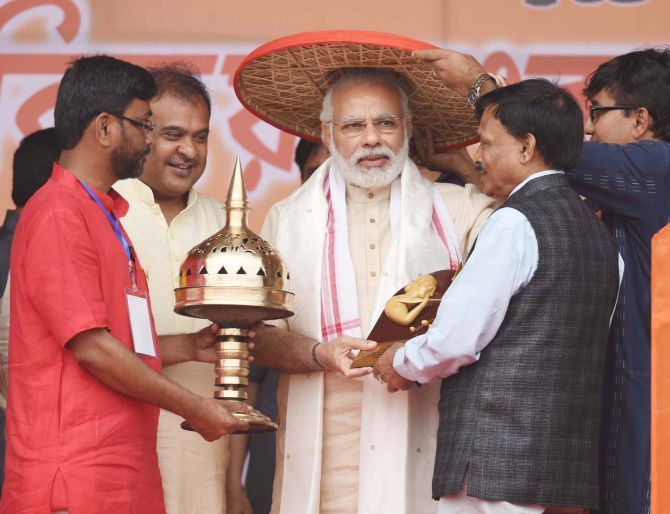The momentum the BJP has in its favour is partly due to the anti-incumbency wave the Congress is battling, notes Supratim Dey.

The stakes are high for the Bharatiya Janata Party in Assam where it is pinning its hopes on forming a government and reversing its losing streak.
The state goes to the polls on April 4 and 11 along with West Bengal, Tamil Nadu, Kerala and Puducherry.
Till recently an insignificant political entity in Assam, the BJP has emerged as a strong force challenging the entrenched Congress. The momentum the BJP has in its favour is partly due to the anti-incumbency wave the Congress is battling.
The Congress has been in power in Assam uninterrupted since 2001, winning the previous assembly election in 2011 emphatically.
The party's sway in Upper Assam's tea belt and the Muslim-dominated Barak Valley and Lower Assam made it look invincible after the 2011 elections. The BJP had then ended up with five seats.
However, soon after its victory, the Congress was beset by dissidence, affecting the performance of the government. Riding on the Narendra Modi wave, the BJP, on the other hand, performed surprisingly well in the 2014 Lok Sabha polls when it won seven of the state's 14 seats, almost sweeping Upper Assam.
The BJP has had a head start, entering the fray with a rainbow coalition of four regional parties. The possibility of a split in anti-Congress votes in Upper Assam nudged it into a pre-poll alliance with the Asom Gana Parishad. It has left 24 seats for the AGP to contest.
The BJP has also tied up with the Bodoland People's Front and two small parties representing the Tiwa and Rabha communities.
A year ago, the BJP received a boost when Congress leader Himanta Biswa Sarma joined it along with a group of disgruntled MLAs.
Sarma is a workhorse, a good orator and a strategist. He is the number two face in the state BJP and is in charge of managing the election campaign.
IMAGE: Prime Minister Narendra Modi with Assam BJP leaders at a rally ahead of the assembly elections.










